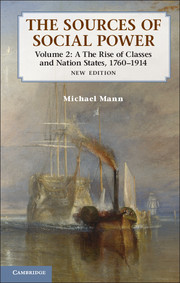Book contents
- Frontmatter
- Contents
- Preface to the new edition
- Preface
- 1 Introduction
- 2 Economic and ideological power relations
- 3 A theory of the modern state
- 4 The Industrial Revolution and old regime liberalism in Britain, 1760–1880
- 5 The American Revolution and the institutionalization of confederal capitalist liberalism
- 6 The French Revolution and the bourgeois nation
- 7 Conclusion to Chapters 4–6: The emergence of classes and nations
- 8 Geopolitics and international capitalism
- 9 Struggle over Germany: I. Prussia and authoritarian national capitalism
- 10 Struggle over Germany: II. Austria and confederal representation
- 11 The rise of the modern state: I. Quantitative data
- 12 The rise of the modern state: II. The autonomy of military power
- 13 The rise of the modern state: III. Bureaucratization
- 14 The rise of the modern state: IV. The expansion of civilian scope
- 15 The resistible rise of the British working class, 1815–1880
- 16 The middle-class nation
- 17 Class struggle in the Second Industrial Revolution, 1880–1914: I. Great Britain
- 18 Class struggle in the Second Industrial Revolution, 1880–1914: II. Comparative analysis of working-class movements
- 19 Class struggle in the Second Industrial Revolution, 1880–1914: III. The peasantry
- 20 Theoretical conclusions: Classes, states, nations, and the sources of social power
- 21 Empirical culmination – over the top: Geopolitics, class struggle, and World War I
- Appendix: Additional tables on state finances and state employment
- Index
- References
1 - Introduction
Published online by Cambridge University Press: 05 July 2013
- Frontmatter
- Contents
- Preface to the new edition
- Preface
- 1 Introduction
- 2 Economic and ideological power relations
- 3 A theory of the modern state
- 4 The Industrial Revolution and old regime liberalism in Britain, 1760–1880
- 5 The American Revolution and the institutionalization of confederal capitalist liberalism
- 6 The French Revolution and the bourgeois nation
- 7 Conclusion to Chapters 4–6: The emergence of classes and nations
- 8 Geopolitics and international capitalism
- 9 Struggle over Germany: I. Prussia and authoritarian national capitalism
- 10 Struggle over Germany: II. Austria and confederal representation
- 11 The rise of the modern state: I. Quantitative data
- 12 The rise of the modern state: II. The autonomy of military power
- 13 The rise of the modern state: III. Bureaucratization
- 14 The rise of the modern state: IV. The expansion of civilian scope
- 15 The resistible rise of the British working class, 1815–1880
- 16 The middle-class nation
- 17 Class struggle in the Second Industrial Revolution, 1880–1914: I. Great Britain
- 18 Class struggle in the Second Industrial Revolution, 1880–1914: II. Comparative analysis of working-class movements
- 19 Class struggle in the Second Industrial Revolution, 1880–1914: III. The peasantry
- 20 Theoretical conclusions: Classes, states, nations, and the sources of social power
- 21 Empirical culmination – over the top: Geopolitics, class struggle, and World War I
- Appendix: Additional tables on state finances and state employment
- Index
- References
Summary
This volume continues my history of power through the “long nineteenth century,” from the Industrial Revolution to the outbreak of World War I. Focus is on five Western countries at the leading edge of power: France, Great Britain, Habsburg Austria, Prussia-Germany, and the United States. My overall theory remains unchanged. Four sources of social power – ideological, economic, military, and political – fundamentally determine the structure of societies. My central questions also remain the same: What are the relations among these four power sources? Is one or more of them ultimately primary in structuring society?
The greatest social theorists gave contrary answers. Marx and Engels replied clearly and positively. In the last instance, they asserted, economic relations structure human societies. Max Weber replied more negatively, saying “no significant generalizations” can be made about the relations between what he called “the structures of social action.” I reject Marxian materialism, but can I improve on Weberian pessimism?
There is both good news and bad news. I want you to read on, so I start with the good news. This volume will make three significant generalizations concerning primacy. I state them outright now; the rest of the book will add many details, qualifications, and caveats.
During the eighteenth century, two sources of social power, the economic and the military, preponderated in determining Western social structure. By 1800, the “military revolution” and the rise of capitalism had transformed the West, the former providing predominantly “authoritative” power and the latter predominantly “diffused” power.
[…]
- Type
- Chapter
- Information
- The Sources of Social Power , pp. 1 - 22Publisher: Cambridge University PressPrint publication year: 2012



